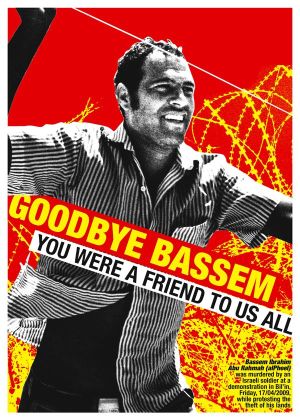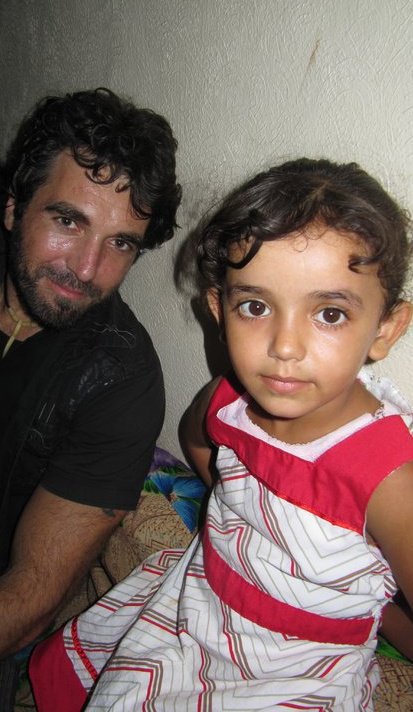11 April 2011 | Issa Amro
Hebron’s problems began after 1967. The Israeli army worked hard to create the Kiryat Arba settlement, and after that the settlers and soldiers started living inside Hebron, transforming it into an occupied city. We started to feel it when they created settlements in the heart of the city. In the early 1980s settlers started to come from all over the world, moving into our houses and markets. They treated Palestinians as slaves and animals, fourth-class humans, only there to be taken advantage of.
All this was not so obvious until 1994 and the Ibrahimi Mosque massacre, when a fanatic settler killed 29 Muslims. After that we were punished. The apartheid policy was employed more obviously, with the closure of Shuhada Street and many local businesses. The army divided Ibrahimi Mosque and confiscated the gardens.
My resistance efforts began in 2003. The army had closed Palestine polytechnic University when I was a student there. They locked the gates and told us to “go to the streets. You will have no future here.” This made my decision. I would struggle, in a nonviolent way. I was fortunate to be guided by a specialist in activism. With him I discussed strategic planning and a methodology for how to re-open our university. One day we just broke in, opened the doors, started the classes and began to study by ourselves. The army arrived shortly after, so we camped out in a sit-in tent that we had bought. We called our international friends and media. We explained to everybody the importance of our university to us. After six months, it was finally re-opened.
That has given me the encouragement to continue ever since. I understand when Palestinians feel that resistance is hopeless. The Israeli army does not distinguish between unarmed demonstrators and armed enemies. They have one law, which is against protest in every form. To oppose them is to provoke a killing machine.
I do not criticise any form of resistance. It is our right. I follow the nonviolent path for two main reasons. Firstly, I want our community to remain peaceful. As Ghandi said, using violence to be rid of an oppressor “establishes a pattern of violence.” This is not our way. Secondly, through nonviolence we can achieve massive participation from whole communities rather than individuals.
Nonviolence is dangerous for the occupation. How do I know? Between April 2010 and now, I have been arrested no less than ten times. This tells me that our methods are working. The army is not trained to deal with nonviolence, as the Egyptian authorities were unable to handle the youth movements. It is only a matter of time, and will, before we see a similar result here. When I am arrested they try to paint me as a terrorist. I have been accused of attacking policemen and settlers, of stealing guns, and of other crimes which fit their image of Palestinians. I am never discouraged by being arrested, but it is very difficult for my wife and family. We all know that my safety is endangered by my activities.
The army has a new crime to accuse us of: “incitement.” It is such a vague term that it can be applied to anything, especially protest. It carries the threat of prison time and was used to jail Bi’lin organiser Abdallah Abu Rahmah in 2009. The creation of this law implicates the highest Israeli authorities and the legal system in allowing, even promoting, institutional racism. The law itself is racist. If incitement means anything, why not use it against Israeli Foreign Minister Avigdor Lieberman, who talks about killing people, rather than me, for exercising my right to peaceful demonstration? We see racist laws every day in Hebron, where we are under Martial Law, and our settler neighbours are under Israeli Civic Law.
We look to international leaders to help our struggle against settlements, and we were shocked by the recent American veto (of a UN resolution condemning them). US leaders announce that they are against them, but when they are tested we find that they are still blindly supporting Israel.
So we must do it ourselves. I represent the Youth Against Settlements group in Hebron, which includes the Tel Rumeida project, empowering families to deal with the daily effects of settlers. Our work is preventing the quiet transfer of Palestinians from their homes and is a barrier against the beatings, theft, and rights abuses so common here.
Yet we face a complex and determined opposition. The Israeli government is clever in using settlers. They are trying to say that Hebron is important for religious history, but what I hear from settlers is that it is a step towards taking Nablus, Ramallah, and the entire West Bank. Hebron is a frontline. If they succeed here in their campaign of ethnic cleansing under the banner of religion, they will move on to new goals.
But I am very optimistic about the future. Our Open Shuhada Street demonstrations attract thousands. Our movement is growing, and we will soon have a new Youth Against Settlements branch in Ramallah. We need Palestinians from all towns and villages to come and lend us their support. On the settlement issue we are all united and our youth activism movements are developing. International boycott campaigns against settlements must continue as they are already effective. It is only a matter of time before we see our own mass nonviolent uprising, as in the other Arab countries. A new generation is coming together to reject the violence and injustice of settlements. I believe it will happen next year.
Issa Amro is a lifelong Hebron resident. He is an electrical engineer, human rights activist and community leaders. He has founded several youth projects and initiatives





